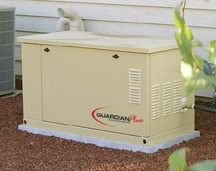How Much Does a Home Generator Cost
A home generator is an important safety precaution that enables your home to continue to use electricity even during a power failure. Also known as emergency generators or backup generators, these machines can literally be life savers if you live in an area like Miami, for example, which suffers from frequent tropical storms and hurricanes.
Permanent Generators
Generators can be either permanent or portable. Permanent generators are installed outdoors, usually on a slab of concrete, much like a central air conditioning unit. They run from an independent power source, typically propane or gasoline. These are also known as standby generators, because they are attached to your home’s power source, ready to automatically begin supplying your home with electricity should a power failure occur.
A small permanent generator that provides 10-15 Kilowatts will typically cost between $3,000 - $10,000, and an added $400 - $1,000 for installation fees. A larger generator that can provide 20 – 40 Kilowatts will usually cost between $5,000 and $20,000. These generators will operate even if you’re away, saving you the headache of returning home to a refrigerator full of spoiled food.
Portable Generators
As opposed to a permanent generator, a portable generator, usually on wheels, must be activated, and your home’s source of power much be manually switched to generator power. Portable generators are noisier and cannot be used while indoors, but are less expensive. A small, portable generator that can provide up to two Kilowatts of electricity typically costs under $500. A medium-sized generator that supplies 3-7 Kilowatts will usually cost between $400 and $1,000. A larger generator that can provide 8-12 Kilowatts will generally cost between $1,000 and $5,000.
Battery-Powered Generators
In addition to diesel- and gasoline-powered generators, battery-powered generators are also available. The advantages of batter-powered generators are that they start up quicker, run more quietly, do not give off emissions, and do not require storage space for containers of gasoline. The downside, however, is that batteries can only run for a limited time, and also tend to have very low Kilowatt capabilities. Most provide just 1.5 – 3 Kilowatts, and usually cost between $400 and $800.
Determining Your Home’s Needs
To determine how much power your home needs, make a list of items you would want powered during a blackout. Each device should have a watt rating. If there is only an amps rating, multiply that number by 120 to find the wattage. If an appliance uses a motor, you’ll have to find the startup wattage and use that instead. Add up the total wattage of the items, and then add an additional 10 or 15 percent to be safe. This is the amount of power your generator must provide in order to meet your needs.
Tips
Be aware that the energy produced by generators is not the same as grid-supplied electricity. Generators produce harmonic distortion, which can affect or even damage sensitive devices like televisions and computers.
If you choose to install a permanent generator, be sure to hire a quality, experienced electrician. If you plan on purchasing a portable generator and want it hooked up to your home’s power supply, you’ll need an electrician to install a transfer switch which you can turn on when you want your home’s appliances to run from the generator’s power.
Generators can be essential in times of need. Whether a disaster strikes, or a small wiring issue causes a power outage, you’ll want your family to be safe and secure. Whichever generator you choose, be sure a reliable professional is consulted.
Looking for a Pro? Call us (866) 441-6648

Electrical Average Costs
Electricians Experiences

Hot Tub Installation By The “BEST” Electrician

Electrical Installation As Part Of A Living Room-to-Office Conversion




